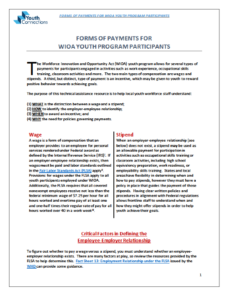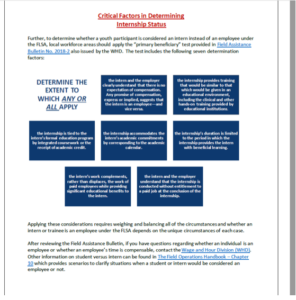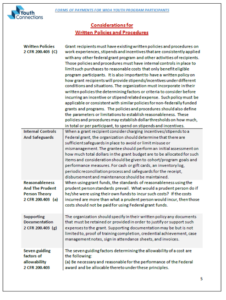Forms Of Payments For WIOA Youth Program Participants
As outlined in 20 CFR 681.640, the local program must have written policies and procedures in place governing the award of incentives and must ensure that such incentives payments are: (a) tied to the goals of the specific program; (b) outlined in writing before the commencement of the programs that may provide incentive payments; (c) align with the local program’s organizational policies; and (d) are in accordance with the requirements contained in 2 CFR part 200.
NOTES ON INCENTIVES: Payments for incentives should not be confused with compensation of wages or stipends. When considering types of incentive payments, keep in mind that Federal funds may not be spent on entertainment costs as outlined in 2 CFR 200.438. Therefore, incentives may not include entertainment, such as movie or sporting event tickets or gift cards to movie theaters or other venues whose sole purpose is entertainment.
When reasonable and prudent, and when clear policies, internal controls and safeguards are in place, non-entertainment related gift cards may be an option. These are considered a cash equivalent and should be treated as if they were cash. Just like cash management, the expectation is that grant recipients will have internal controls over the management of the gift cards (by keeping an inventory log, identifying and training appropriate personnel when it’s appropriate to distribute gift cards, etc.) Gift cards should be used as an incentive (with an established incentive policy in place) and not as a substitute to wages and stipends. Finally, there must be measures in place if there is excessive purchasing of gift cards as these funds (not the gift cards) must be returned to ETA during the closeout of the grant. We encourage local programs to exercise restraints in purchasing gift cards as incentives to avoid Closeout issues.
Importance of Developing Policies for Wages, Stipends, and Incentives
Understanding the difference between wages and stipends and correctly classifying payments is critical since the misidentification of the payment could result in disallowed costs. Important for local workforce practitioners is: (1) understanding the distinctions between wages and stipends; and application for awarding incentives; and (2) adhering to the requirement to establish a policy for the award of stipends, wages, and incentives. Policies must be in accordance with the state and/or local area policies of the grant recipient organization. The determination whether to pay a stipend or wage is left to the discretion of the local area based on guidelines provided by WHD. Please review 2 CFR 200.430 and 2 CFR 200.431 on the development on policy and procedures in regards to wages and 2 CFR 200.402-200.411 for basic considerations for allowable costs.
Local workforce areas should be aware of the implications of such payments under both the FLSA administered by WHD and the Internal Revenue Service’s laws and regulations. When considering compensations addressed in this brief, local grant recipients should review FLSA’s labor standards for work experiences and training activities.
Again, if an employer-employee relationship exists based on the FLSA’s criteria, then wages must be paid and where no employer-employee relationship exists, stipends may be used. Your decision should consider: the proposed payment; the type of activity whether focused on employment or training; and the local area policy related to participant payments.












